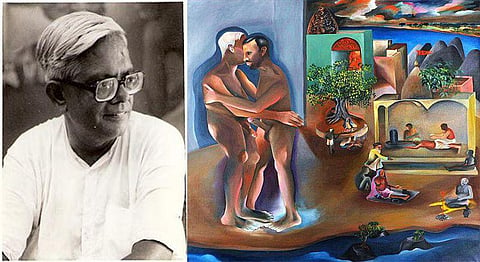
- HOMEGROWN WORLD
- #HGCREATORS
- #HGEXPLORE
- #HGVOICES
- #HGSHOP
- CAREERS
- ABOUT US
- CONTACT US

Bhupen Khakhar’s infamous Two Men In Benaras (1982), oil on canvas painting, depicts an intimate scene of love situated in the pilgrimage capital of India. The shades near the soles and toes are smudged with moon-like dust and depicts the desire and lust the two subjects have for each other. Khakhar was one of India’s few openly gay contemporary artists. Yayati (1987) by Khakhar explores and creates a dialogue between intimacy, religion, and mythology. ‘Yayati’ was the first king of Pauravas. Decades before, Kharkhar was exploring, then staunchly believed, taboo topics such as the Hindu/Muslim conflict in India and his own homosexuality.
In March of 1934, Khakhar was born in Bombay to a colonial India, where the decriminalisation of homosexuality was still a far-fetched dream. He hailed from the neighbourhood of Khetwadi and was the youngest of four children. In the trajectory of his life, Khakhar was first an accountant who obtained his Bachelors of Commerce degree at the University of Bombay.
His self-trained skills with the arts were nurtured after he enrolled in a Master of Arts programme in Baroda in 1964 and was simultaneously introduced to the art world filled with luminaries by his friend and esteemed painter and art historian Ghulam Mohammed Sheikh.
In a 2002 BBC article Khakhar declares, “My interest is something which is around me, something which is part of my life, the things that I see.” Khakhar’s paintings included numerous depictions of urban life, the Indian middle class and the daily motions of travel and settlement.
In a documentary by the British Film Institute, titled Messages from Bhupen and directed by Judy Marle, Bhupen states with sincerity and warmth and heartiness that his profits have declined after exploring contemporary ideals and how his sellers found his paintings ‘vulgar’. The documentary explores Khakhar’s modest living and his creative process while inhabiting a nostalgia for the past.
Bhupen Khakra experienced the gay-rights movement in 1979 when he visited England and it was then he felt acceptance and comfort with his own sexuality. In 1981 he painted ‘You Can’t Please All’ which is widely regarded as a symbol of his coming out. Also deeply influenced by religion and Khalighat paintings and was often associated with inhabiting pop culture movements. Khakhar lived an open-ended life and is still revered for his voice and hybrid visualisations around the world. He died in 2003 leaving behind a large unparalleled legacy.
If you have enjoyed the article, we suggest you read:
